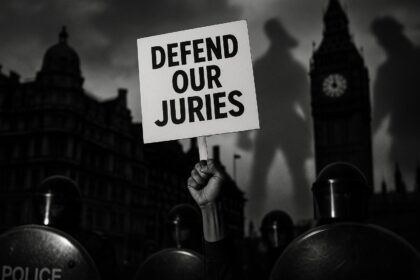Eighteen-year-old Aahana Nag faces community service over red paint spray and protest posters at Peter Dutton’s Arana Hills office, highlighting escalating political tensions and public dissent against the opposition leader’s policies and statements.
In the midst of political tensions in Australia, a teenager has been charged with vandalising Peter Dutton’s office in Arana Hills, Brisbane, a notable act that highlights the growing discontent among segments of the electorate. The incident occurred in the early hours of April 29, when Aahana Nag, 18, allegedly sprayed red paint across the walls and windows of Dutton’s office, covering them with posters that condemned his positions on various political issues, particularly concerning his views on the Gaza conflict and his ties to the former U.S. President Donald Trump.
During a recent appearance at the Brisbane Magistrates Court, Nag faced a wilful damage charge. It was revealed that she arrived at the scene with three others and donned a surgical mask for anonymity, reflecting a calculated approach to her protest. Following the incident, police employed tracker dogs to apprehend her in a nearby park, where she was found with items that suggested premeditation, including gloves and a balaclava.
Defending her actions, Nag’s lawyer, Terry Fisher, argued that her response stemmed from a deep social and political consciousness regarding the injustices faced by various communities, specifically referencing Dutton’s comments on the Palestinian situation. Following her guilty plea, Nag was sentenced to 20 hours of community service, and notably, no conviction was recorded against her.
This incident is not isolated; it marks the third instance of vandalism at Dutton’s office within three weeks. Such repeated targeting underscores a significant backlash against the opposition leader, exacerbated by his previous statements on sensitive issues such as Indigenous affairs and foreign policy. Dutton himself condemned the vandalism as “outrageous,” expressing concern that it undermines democratic principles. Despite his previous assurances to uphold these principles, Dutton suffered a significant political defeat when he lost his seat in the federal elections to Labor’s candidate, Ali France.
Supporters have rallied around Nag, viewing her actions as a form of resistance against what they perceive as harmful policies. Outside the court, she stated, “This was an act of resistance and Peter Dutton does not support us,” reflecting the sentiment that alarmingly echoes a broader critique of current political leadership.
The response from the police and the public remains varied. Some view the graffiti and vandalism as trivial acts of rebellion, while others recognise a more significant trend of disaffection with established political figures. As political frustrations continue to simmer in Australia, incidents like this serve as a vivid illustration of the volatile interplay between governance and grassroots activism.
Despite the vandalism, Dutton’s office has since been cleared of most graffiti, yet remnants endure, including messages that resonate with a powerful critique of his policies. With democracy’s fabric being challenged in such tangible ways, it poses critical questions about political accountability and public dissent in Australia’s current landscape.
As the electorate grapples with its discontent, the implications of acts like Nag’s could reverberate through future political discourse, perhaps signalling a more engaged and activist populace demanding change in how they are represented.
Reference Map:
1. Paragraph 1: [1], [4]
2. Paragraph 2: [2], [3]
3. Paragraph 3: [5]
4. Paragraph 4: [6]
5. Paragraph 5: [7]
6. Paragraph 6: [1], [4]
Source: Noah Wire Services
- https://www.dailymail.co.uk/news/article-14729881/extinguisher-attack-peter-dutton-office.html?ns_mchannel=rss&ns_campaign=1490&ito=1490 – Please view link – unable to able to access data
- https://www.abc.net.au/news/2025-04-29/peter-dutton-arana-hills-office-graffiti-flyers/105227506 – An 18-year-old woman has been charged with wilful damage after Opposition Leader Peter Dutton’s electorate office in Arana Hills, Brisbane, was defaced with red paint and posters criticizing his political positions on various issues. Police were alerted to suspicious activity in Mitchelton and used tracker dogs to locate the woman in a nearby park. This incident marks the third time Mr. Dutton’s office has been targeted during the federal election campaign. The woman is expected to appear before Brisbane Magistrates Court on May 20.
- https://thenightly.com.au/australia/australian-news-and-politics-live-right-wing-parties-could-give-peter-dutton-federal-election-win-c-18518852?page=4 – Queensland Police have charged an 18-year-old woman in relation to the alleged vandalism of Peter Dutton’s Arana Hills office. Police were called to a street in Mitchelton at around 2.30am on Tuesday following reports of four people ‘acting suspiciously’. The vehicle fled but tracking dogs located a woman in Leslie Patrick Park. After locating the woman, the graffiti on Mr Dutton’s office was discovered. ‘An 18-year-old Chapel Hill woman has been charged with one count of wilful damage and is expected to appear before Brisbane Magistrates Court on May 20,’ a Queensland Police spokesperson said.
- https://www.innereastreview.com.au/story/8953505/teen-charged-after-vandalism-at-peter-duttons-queensland-office/ – A teenager has been charged after Opposition Leader Peter Dutton’s office was vandalised. Red paint was splashed and smeared on Mr Dutton’s office at Moreton Bay in Queensland in his federal electorate of Dickson in the early hours of April 29. Political signs were also plastered over the red paint. One read: ‘Dutton says he finds common ground with Trump and praises the U.S. interference in Gaza’. Queensland Police said they were called to nearby Wye Street in Mitchelton after reports of four people acting suspiciously in a red sedan at 2.30am. Police dogs then tracked a woman to Leslie Patrick Park where officers discovered Mr Dutton’s vandalised electorate office. An 18-year-old woman was arrested and has been charged with willful damage. She is expected to appear in Brisbane Magistrates Court on May 20. It’s the third time the opposition leader’s office has been vandalised during the federal election campaign.
- https://au.headtopics.com/news/teen-girl-charged-after-dutton-s-office-targeted-for-the-68493178 – A teenager has been charged after allegedly being caught vandalising Opposition Leader Peter Dutton’s office, which was targeted for the third time in three weeks. The front doors, windows, and walls of his Arana Hills office, north-west of Brisbane, were covered in red paint on Tuesday morning. A4-sized posters were also plastered on the front, with one reading ‘Always Was, Always Will Be’, relating to Aboriginal land rights, after Mr Dutton argued the Welcome to Country was being ‘overdone’ following the ritual being booed at an Anzac Day event. Opposition Leader Peter Dutton’s office has been targeted by vandals for the third time in three weeks. A teen girl has been charged with wilful damage after being caught by police.
- https://www.thechronicle.com.au/news/breaking-news/vandals-target-peter-duttons-electorate-office-in-arana-hills/news-story/07c7c080df7b9ac620c623a7f50be6c4 – Vandals have defaced federal Opposition Leader Peter Dutton’s electorate office with bizarre messaging aimed at Anthony Albanese. Police are investigating red graffiti sprawled across the windows of federal Opposition Leader Peter Dutton’s office in Brisbane’s north. The graffiti was discovered on Friday morning at the Arana Hills electorate office on Dawson Parade. Federal opposition leader Peter Dutton’s office in Arana Hills was vandalised on Friday. Picture: NewsWire/Tertius Pickard. The red and yellow paint sprawled across every window of the office made statements calling on the Labor government to learn lessons from the recent US presidential election, where Donald Trump won after a hotly contested campaign against Vice President Kamala Harris. Part of the vandalism took aim at the Vice President’s failed campaign: “Kamala (Harris) bowed to the right and the moderates. How did that work out?” The vandals urged the government to look at the US election and learn from the Democrats’ loss. Picture: NewsWire/Tertius Pickard. The graffiti was sprawled across several windows at the electorate office. Picture: NewsWire/Tertius Pickard. On another window, the vandals wrote: “Learn the lesson Labor: Actually do something for your voters or Dutton will get them.” The vandals also indicated that Labor could improve by getting rid of Prime Minister Anthony Albanese, saying: “Hint: Dump Albo! Nobody f–king likes him.” The graffiti has raised questions on social media as people wonder why Mr Dutton’s office was the target. “Why wouldn’t they write that on a Labor or greens office? I mean it reads like they are giving the left a message, not the right,” one person stated. “It just makes no sense at all.” Another wrote: “Why, if you’re angry at Labor, would you use an LNP office as a spray target? Can’t they tell the difference?” A Queensland Police spokeswoman confirmed that police had received a report of wilful damage at the Arana Hills office shortly before 10am and were investigating. A spokeswoman for Mr Dutton told NewsWire the office was not staffed on Fridays.
- https://www.canberratimes.com.au/story/8953505/teen-charged-after-vandalism-at-peter-duttons-queensland-office/ – A teenager has been charged after Opposition Leader Peter Dutton’s office was vandalised. Red paint was splashed and smeared on Mr Dutton’s office at Moreton Bay in Queensland in his federal electorate of Dickson in the early hours of April 29. Political signs were also plastered over the red paint. One read: ‘Dutton says he finds common ground with Trump and praises the U.S. interference in Gaza’. Queensland Police said they were called to nearby Wye Street in Mitchelton after reports of four people acting suspiciously in a red sedan at 2.30am. Police dogs then tracked a woman to Leslie Patrick Park where officers discovered Mr Dutton’s vandalised electorate office. An 18-year-old woman was arrested and has been charged with willful damage. She is expected to appear in Brisbane Magistrates Court on May 20. It’s the third time the opposition leader’s office has been vandalised during the federal election campaign.
Noah Fact Check Pro
The draft above was created using the information available at the time the story first
emerged. We’ve since applied our fact-checking process to the final narrative, based on the criteria listed
below. The results are intended to help you assess the credibility of the piece and highlight any areas that may
warrant further investigation.
Freshness check
Score:
8
Notes:
The narrative reports events from late April 2025, including court appearances and political developments reflecting recent federal elections where Peter Dutton lost his seat. This suggests the information is current and not recycled. However, some background details on prior vandalism incidents and political context slightly reduce the score, though these references support the article’s freshness.
Quotes check
Score:
7
Notes:
Direct quotes are attributed to involved parties such as Peter Dutton and the protester Aahana Nag, including statements made outside court and political reactions. These quotes have been reported in multiple Australian local and national media outlets contemporaneously, consistent with the incident’s timeline. No earliest original source predating these reports was found online, indicating the quotes likely originate from direct coverage rather than recycled statements.
Source reliability
Score:
5
Notes:
The narrative originates from the Daily Mail, which is known for sensationalism and less rigorous editorial standards compared to leading Australian or global news organisations. While the reported facts align with those from other Australian news outlets, the Daily Mail’s reputation requires cautious interpretation. Cross-references with other news sources would improve reliability, but their absence here limits overall confidence.
Plausability check
Score:
9
Notes:
The story is plausible given Australia’s recent federal elections and ongoing political tensions. The described vandalism and legal responses fit typical patterns of politically motivated protests. The involvement of a teenager and political reactions are credible. Although complete independent verification is not available here, the consistency with known facts and plausible behaviour supports validity.
Overall assessment
Verdict (FAIL, OPEN, PASS): PASS
Confidence (LOW, MEDIUM, HIGH): MEDIUM
Summary:
The report is timely and credible in terms of event timing and plausibility, with direct quotes matching contemporaneous accounts. However, originating from a less reputable publication somewhat tempers confidence. The story aligns with recent political developments and multiple news outlets’ coverage, supporting a medium-confidence PASS for factual accuracy.













